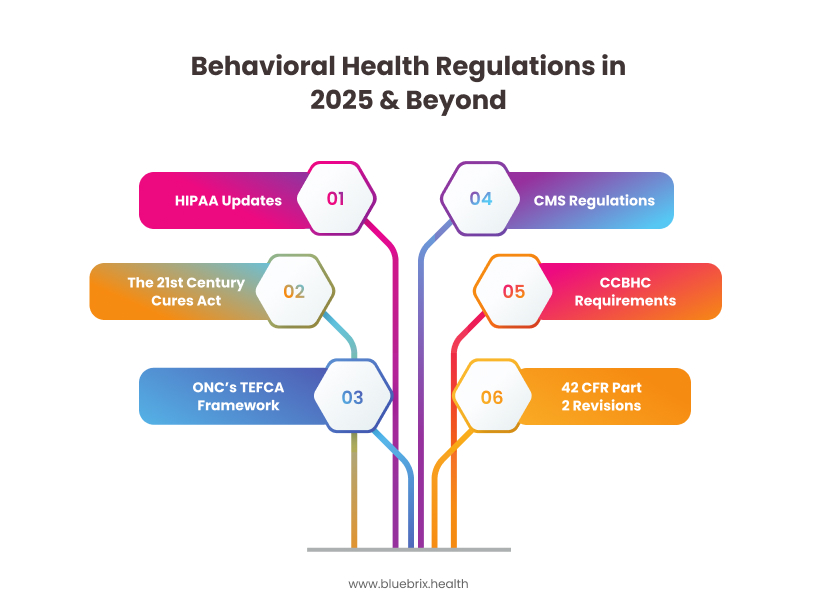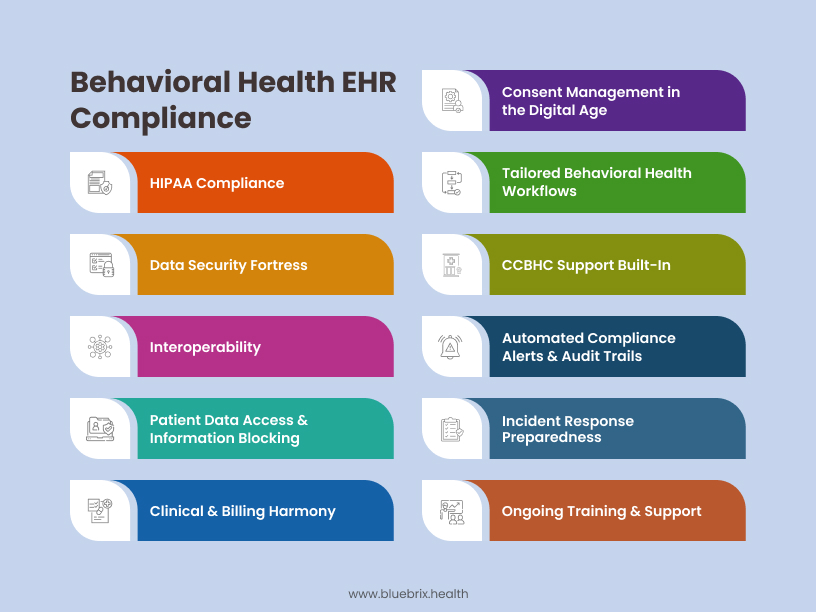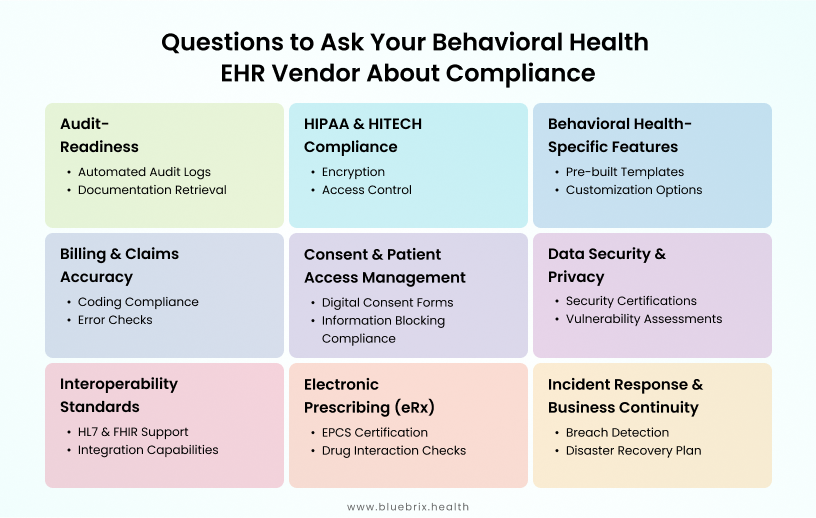Compliance in behavioral health isn’t just complex—it’s critical. With tighter rules around data privacy, documentation, and patient rights, your behavioral health EHR should actively help you stay compliant, audit-ready, and focused on care. Behavioral health practices are under increasing scrutiny as they manage some of the most sensitive patient data, making them prime targets for audits and compliance reviews.
The consequences of falling short are steep: financial penalties, legal exposure, and a breakdown in trust with patients, staff, and payers. That’s why modern, compliance-ready Electronic Health Records (EHRs) are essential.
In this blog, we’ll break down what behavioral health providers need to check in their EHR systems right now to stay compliant—and ahead of the curve.
Key regulations impacting behavioral health in 2025 and beyond
2025 brings sweeping updates: HIPAA, TEFCA, Cures Act, and CCBHC all demand secure, interoperable, and transparent systems. If your EHR can’t keep pace, you’re at risk.
Key regulations

- HIPAA updates are tightening the screws on data privacy and interoperability. It’s not just about protecting information anymore, but more about ensuring that health data flows securely across systems, without friction or risk.
- The 21st century cures act continues to expand patients’ rights to access their health information while cracking down on information blocking. If your behavioral health EHR can’t support transparent, on-demand data sharing, you’re already behind.
- ONC’s TEFCA framework is laying the groundwork for a national, trusted data exchange network. For behavioral health, this means moving from siloed records to seamless, coordinated care—if your systems are prepared to connect.
- CMS regulations are putting value-based care front and center. Reimbursement now hinges on measurable outcomes, not just services delivered—so your behavioral health EHR needs to support real-time tracking and quality reporting.
- CCBHC requirements are evolving too, with expanded service mandates and tighter data reporting expectations. Clinics need EHRs must track not just what care was given, but how it impacts outcomes over time.
- 42 CFR Part 2 revisions have added even more complexity to managing substance use disorder records. These changes demand granular control over who can see what, when—and your EHR needs to be up to the task.
State-specific mandates
Beyond federal rules, state-level compliance is a maze of its own. From variations in telehealth coverage and documentation requirements to localized laws around safety planning, emergency reporting, and involuntary commitment—what’s required in one state may be prohibited in another. For instance, New York is currently proposing updates to its involuntary commitment laws, potentially reshaping how behavioral health providers manage crisis care. If you’re practicing in multiple states, your behavioral health EHR needs to flex with every border crossed.
What are the common compliance pitfalls behavioral health providers face?
Even the most well-intentioned behavioral health providers can find themselves out of step with compliance requirements—often due to outdated systems or overlooked gaps in day-to-day operations. One major vulnerability is insufficient data privacy safeguards. Without robust security protocols, behavioral health data is at serious risk of breaches or unauthorized access—something that not only violates HIPAA but erodes patient trust instantly. Then there’s the issue of interoperability. If your EHR can’t communicate effectively with other systems, you’re not just failing a tech standard—you’re risking fragmented care, delays, or even harmful treatment errors.
Another area where providers stumble is audit and reporting readiness. Many systems simply don’t support the level of transparency or documentation now required by regulators, making it difficult to prove compliance when it counts. Similarly, outdated consent and documentation workflows create compliance gaps—especially when patient authorizations are missing, incomplete, or scattered across systems. And for those pursuing or maintaining CCBHC status, the challenge only multiplies. CCBHC certification demands rigorous service tracking and reporting, and providers without purpose-built EHR tools often struggle to meet the bar. These pitfalls aren’t just administrative—they’re financial, legal, and reputational risks waiting to happen.
Why a purpose-built behavioral health EHR is your best defense against compliance risks
A behavioral health EHR should automate reporting, support consent tracking, and align with complex documentation standards—helping you stay compliant without the burnout.
For starters, it simplifies quality reporting by automating submissions for MIPS, MACRA, and other value-based care programs. Real-time outcome tracking and analytics give you a clearer picture of clinical performance, while built-in tools for population health and risk stratification help you identify and intervene with high-risk patients before conditions escalate.
Documentation for reimbursement is another high-stakes area. With behavioral health-specific coding and workflows, a purpose-built behavioral health EHR reduces the risk of errors, accelerates claims processing, and minimizes audit exposure. It also enforces consistent clinical documentation that aligns with evolving payer requirements and regulatory standards.
Beyond compliance, the operational lift is significant. Purpose-built platforms streamline consent management, support collaborative care plans, and reduce documentation fatigue for clinicians. That means fewer manual tasks, fewer errors, and more time for what matters—delivering quality care.
Perhaps most importantly, a behavioral health EHR built with compliance in mind is future-ready. Whether it’s adapting to CCBHC certification updates, new 42 CFR Part 2 revisions, or state-specific mandates, a scalable, modular system keeps your organization agile and audit-ready—no matter what the regulatory landscape throws at you next.
Your go-to behavioral health EHR compliance checklist: 2025 & beyond
A truly compliant behavioral health EHR in this era needs to be proactive, not just a digital filing cabinet. It’s about building a fortress of security and adherence around your practice. We’re talking HIPAA’s ever-present gaze on data privacy and security, the push for seamless data flow with interoperability (hello, 21st Century Cures Act!), and the granular details of clinical documentation. It can feel like a lot, but a well-chosen EHR acts as your co-pilot in navigating this.
So, let’s walk through what your Behavioral Health EHR absolutely needs to deliver, not just for 2025, but for the foreseeable future:

The foundational pillars of compliance:
- HIPAA compliance: This isn’t just a box to tick. Your EHR must demonstrate robust adherence to HIPAA’s Privacy and Security Rules. We’re talking strong end-to-end data encryption, stringent access controls (role-based is non-negotiable), and a culture of confidentiality baked into the system.
- Data security fortress: Going beyond HIPAA, we need layers of protection. Think multi-factor authentication (MFA) for everyone accessing the system, comprehensive and secure audit logs tracking every interaction, and automatic, reliable data backups with robust disaster recovery plans in place. Regular vulnerability scans are your early warning system – don’t skip them.
- Interoperability: Siloed data is a relic of the past. Your behavioral health EHR must speak the language of modern healthcare. You’ll need full support for FHIR and HL7 standards, seamless integration with Health Information Exchanges (HIEs), and smooth connections with labs, pharmacies, telehealth platforms, and billing systems. Real-time data sharing with referral networks and payers isn’t just good practice; it’s increasingly a compliance expectation.
- Patient data access & information blocking: The 21st Century Cures Act has made patient access a cornerstone. Your EHR needs to empower patients with secure, seamless, and timely access to their health information, without unnecessary delays or manual hurdles. Transparency isn’t just ethical; it’s the law.
- Clinical & billing harmony: Accuracy in documentation translates directly to compliance and clean billing. Your EHR should fully support the latest ICD-11 and CPT coding standards, ideally with automated coding validation and audit tools to catch potential errors before claims go out the door.
- Consent management in the digital age: Paper consent forms are becoming a liability. Your EHR needs robust digital consent tracking, with automated alerts for expiring consents, clear version tracking, and streamlined workflows for obtaining and managing patient authorizations, especially crucial for sensitive behavioral health data (think 42 CFR Part 2!).
Behavioral health specific needs (because it’s not one-size-fits-all):
- Tailored behavioral health workflows: Generic EHRs often fall short. Your system should offer customizable treatment plans, specific support for Substance Use Disorder (SUD) and mental health workflows, efficient medication management, and integrated e-prescribing with drug interaction checks and controlled substance tracking.
- CCBHC support built-in (if applicable): For Certified Community Behavioral Health Clinics, your EHR should be a compliance ally, not an obstacle. This means automated outcomes tracking, configurable reporting templates aligned with grant-specific requirements, and seamless data submission capabilities.
Staying ahead of the curve:
- Automated compliance alerts & audit trails: Proactive is the name of the game. Look for EHRs with real-time documentation gap alerts and comprehensive, built-in audit logs. These features are invaluable for staying compliant and streamlining internal and external audits.
- Incident response preparedness: It’s not if but when. Your EHR vendor should have clear protocols for detecting and responding to security incidents to minimize the impact of data breaches or vulnerabilities.
- Ongoing training & support: Compliance isn’t static. Ensure your EHR vendor provides ongoing staff training on compliance best practices and offers responsive support to address evolving regulations.
Think of your EHR as more than just software; it’s a critical partner in navigating the complex world of behavioral health compliance. By focusing on these key areas, you’re not just meeting requirements; you’re building a foundation for ethical, efficient, and sustainable care. Use this checklist as a starting point, ask tough questions of your vendors, and remember that staying informed is your best defense in an ever-changing regulatory landscape.
Questions to ask your behavioral health EHR vendor about compliance
When it comes to compliance, don’t just take your behavioral EHR vendor’s word for it—ask the right questions to make sure your system can stand up to today’s regulatory demands and tomorrow’s surprises:
- HIPAA & HITECH compliance
- How does your system ensure compliance with HIPAA and HITECH, especially around encryption and access control?
- Do you support role-based access, automatic timeouts, and audit trails out-of-the-box?
- Data security & privacy
- What security certifications does your platform have (e.g., SOC 2, HITRUST)?
- How often are vulnerability assessments or penetration tests conducted?
- Is data backed up in real-time and encrypted both at rest and in transit?
- Interoperability standards
- Does your EHR fully support HL7 and FHIR standards for data exchange?
- Can it integrate with HIEs, labs, pharmacies, referral networks, and telehealth tools seamlessly?
- Behavioral health-specific features
- Do you offer pre-built templates for behavioral health assessments, treatment plans, and progress notes?
- Can we customize forms and workflows to align with CCBHC, SUD, and mental health service documentation requirements?
- Billing & claims accuracy
- How does the system support compliant coding for ICD-11 and CPT?
- Are there built-in checks for common billing errors or under-documentation?
- Electronic prescribing (eRx)
- Is your eRx module certified for EPCS (Electronic Prescribing for Controlled Substances)?
- Does it include real-time drug interaction checks and dosage alerts?
- Audit-readiness
- Can the system generate automated compliance audit logs?
- How easy is it to pull documentation for payers, regulators, or internal QA reviews?
- Consent & patient access management
- Does your system support digital consent forms with version control and expiration tracking?
- How does your platform ensure compliance with the 21st Century Cures Act regarding information blocking?
- Incident response & business continuity
- What’s your process for detecting, reporting, and mitigating security breaches?
- Do you offer a disaster recovery plan or business continuity services if the system goes down?
- Training & support for compliance
- Do you offer a disaster recovery plan or business continuity services if the system goes down?
- How quickly can your team respond if there’s a compliance-related issue during an audit or system review?
These aren’t just box-checking questions—they reflect a proactive, strategic approach to EHR compliance, especially for behavioral health providers navigating unique regulatory challenges like CCBHC certification or value-based care models.





